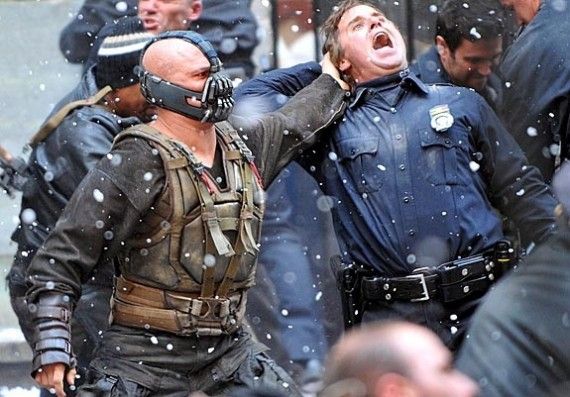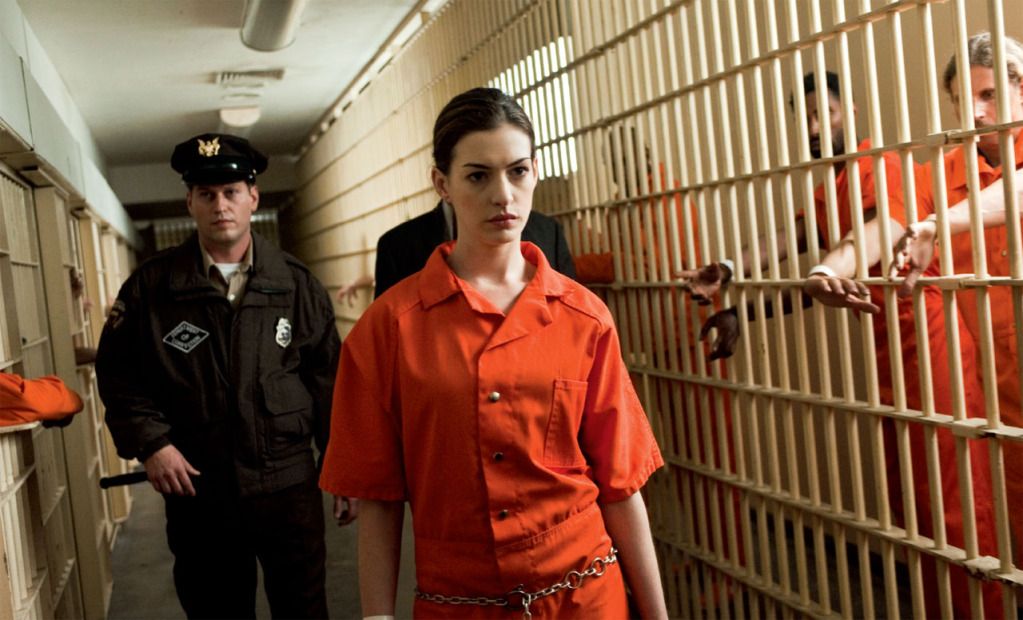The Dark Knight Rises (Nolan, 2012)
Certainly it is the end in a sense. Nolan and Bale are both intent to move forward. Satisfying is a quite a stretch though, because when I think back to the majority of Christopher Nolan's Batman films 'satisfying' is perhaps the word I'm least likely to use, and all of the flaws that I felt were noticeable underneath of the gloss of the previous entries are magnified here in such a way that the sheer excessive heft of the film becomes almost as imposing as Bane.
Most notably the action sequences in the film, few and far between which is quite a feat for a movie that approaches three hours in run time, are generally marked by a camera that has trouble keeping track of everything that is going one. The opening sequence of the film, likely the most successful action bit of the entire movie, cuts and jumps around a bit too much, but is partially saved because it culminates in one of very few filled frames found in the film. As the movie progresses and the action becomes a bit more sprawling the cuts still happen frequently, and to further complicate matters the central figures fall in and out of the center of frame. Now I know everyone doesn't need to be in the center of the screen all the time, this isn't Wes Anderson, but most of the time it seemed as if there was no reason for the camera not to be squarely fixed on Batman and Bane rather than the tangential action.
Speaking of Bane, as a villain he also doubles as a symbol of all the problems that tend to plague this film. I used the word imposing earlier, and that's exactly the problem. The movie's score, generally a tool meant to underscore or enhance the tone of a scene, towers over the entire film in a Bane~esque manner. Like the villain, each time music is employed in the film it encompasses the entire scene. Yet in the one scene that could have most benefit from a heavy score (where a seemingly cataclysmic event happens about halfway through), it was notably absent as the action went on. One of the biggest problems I had with Inception and The Dark Knight was the tonal inconsistency of each film. This has been completely rectified here, but it's done so with all the grace of smashing a rock to one's face.
I think the reason I get disappointed by a film like The Dark Knight Rises, and to a large extent all of the Nolan films I have seen, is because he's able to assemble these impressive ensemble casts and in the end the results consistently leave me feeling empty. Take, for instance, Tom Hardy's turn as Bane. Hardy may very well be one of the five greatest living actors, from his physical tour-de-force in Bronson to his nuanced turn in Warrior his physicality is matched only by the depth his expression brings to many of his roles. Yet because Bane is masked he's left to rely on using his body to sell his performance. The problem is that oftentimes the camera focuses on his face, and ultimately his performance feels restrained rather than this physical specimen of terror. Bale is similarly limited, but in his case the film sets him up to be downtrodden much of the movie and it partially works. But then there are people like Joseph Gordon-Levitt and Marion Cotillard who both have, at points in their careers, given incredible performances but here are reduced either to parodies of self (in the case of Gordon-Levitt) or bland characters meant to be more important than the script allows (Cotillard).
Yet in the center of this mess there's a thread that connects everyone. Anne Hathaway's turn as Selina Kyle is both a marvel of physicality while also a testament to her talents as an actress. It's been a while since Rachel Getting Married, and for me it was easy to forget just how great she can be when she's not just phoning in a rom-com. The character is given enough time to develop in the film, and unlike Cotillard's Miranda Tate, Kyle feels central to the film. Her character seems to have an awareness and sincerity that was lacking from all of the other new characters.
The blame for this falls on the script, and where Inception may have been tonally inconsistent The Dark Knight Rises is perhaps even more infuriating because of how thematically inconsistent it is by the end. For the majority of the film's first hour or so there are constant references to the populist movement, yet as the film progresses it's continually undercut by both the heroes and villains, which would be fine, but it rears its head toward the end again before an inevitable return to normalcy. I've seen plenty of interesting meandering works, ones that actively resist answers or simplistic binaries, but in so many other areas both this film and the series has been marked by binaries or easily identifiable archetypes that here it's especially jarring.
Jarring is actually an apt word to describe my feelings about Nolan's The Dark Knight Rises. Sometimes you can't help but feel jarred when confronting finality, but upon exiting the theater and even now I'm not sure it's a prerequisite. While in the past the flaws have been masked by pacing or the charm of central actors, this film revels in its hollowness. The themes are embryonic, perhaps indicative of humanity itself, but doing so in a film with hardly an echo of genuine humanity seems counter-intuitive. And that just leaves me depressed. Not for the state of our world, not for the characters in the film, but for cinema. That's a terrible feeling.
Rating: **/*****
Rich
Notes of Interest:
I don't do half stars, but this ought to be a 1.5/5.
Tried to avoid spoilers, and for the most part I feel as if I did, but in doing so I think it's difficult to really engage with the film's flaws because some are so context specific that addressing the technical inconsistencies don't do them justice. I need to/should/probably will just go back to posting reviews with spoilers.
The ending of this film bothered me quite a bit, both because it further muddles themes of both the film and the series, as well as how blatantly it seems to be setting up pieces for a sequel if certain actors and actresses decide to stick around following the departure of Bale and Nolan. Talking about external stuff to the film itself doesn't seem incredibly helpful though. All the parts that bothered me about it, even if it was just the end of a trilogy, would have been there regardless.
For a Batman movie, there's not a whole lot of Batman here.
The score had me missing more lines than Bane's voice modulator.
Not sure how similar this is to The Dark Knight, but memory seems to suggest that it feels more like Batman Begins. Certainly the plot is much more dependent on that film than the second. It completely loses the sense of chaos that marked The Dark Knight. Not always productive chaos, but at least mostly entertaining chaos.
Hard to believe that in the time between The Dark Knight and The Dark Knight Rises that Rocksteady was able to put out two Arkham games that completely trump any of the films in this series. Not sure if it's the expansive quality of interactive storytelling or just a credit to the medium itself that both of their works feel like much more cohesive wholes.
I didn't think it was possible, but Hathaway actually gives Michelle Pfeiffer a run for her money as Catwoman.
I didn't think it was possible, but Hathaway actually gives Michelle Pfeiffer a run for her money as Catwoman.
Comments are welcome and, for anyone with a literary mind, I encourage checking out my poetry blog filled with all original works for your reading pleasure.
Also, I am on the old Twitter thing so I guess you can follow me at twitter.com/FLYmeatwad.
And if you want to know what I'm watching, listening to, playing , and reading you can follow my tumblr account!
© 2012 Richard James Thorne



No comments:
Post a Comment